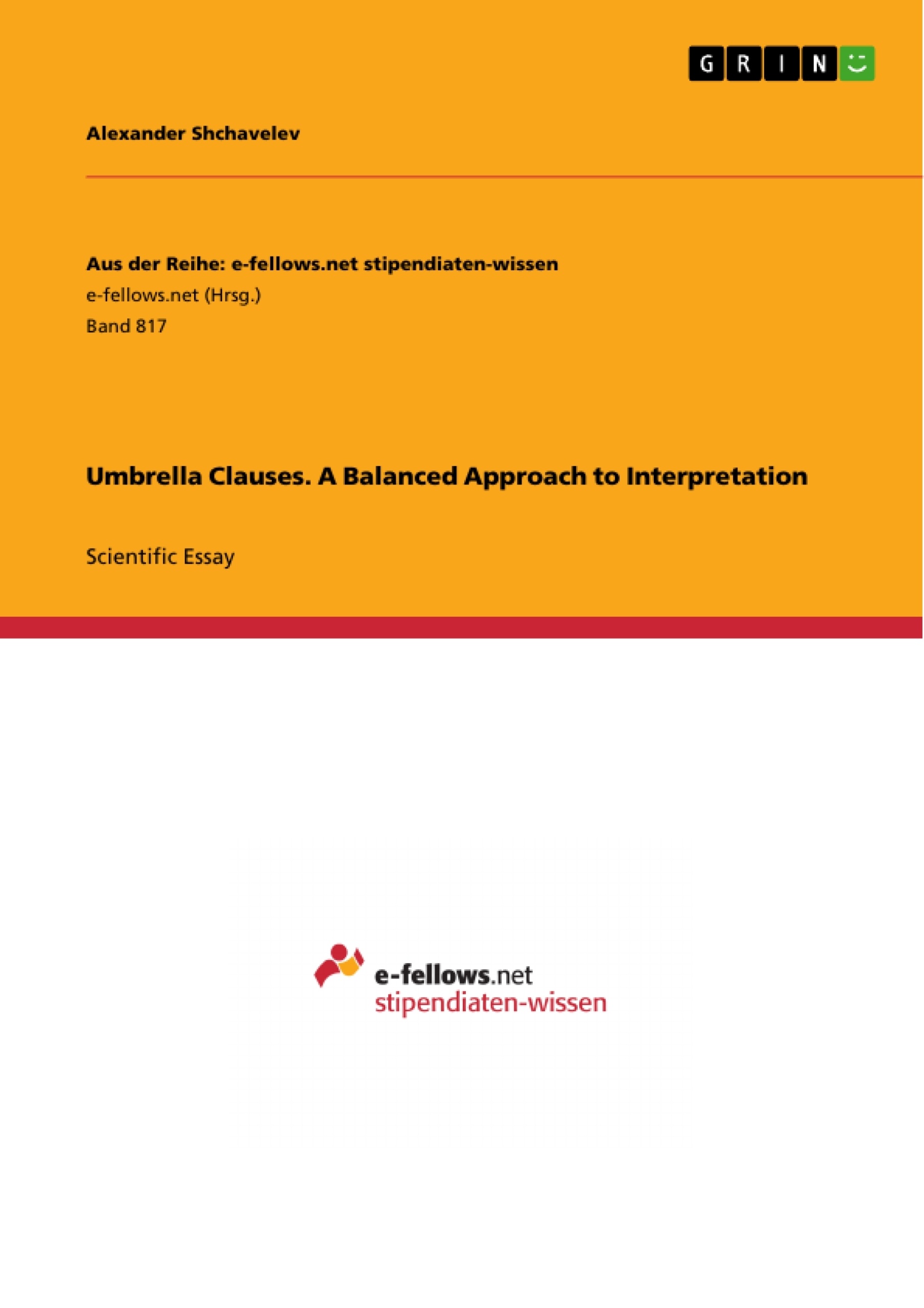In recent years umbrella clauses have become a frequent vehicle for safeguarding investment contracts and their interpretation a major challenge for the competent tribunals. In contrast to the common view umbrella clauses do not blur the distinction between international and municipal law provided that exactly this fundamental distinction is observed in the process of interpretation. This paper advocates a restrictive interpretation of umbrella clauses in order to achieve a balance between the interests of involved actors. In line with the wording and the original function of investment treaties it is argued that only sovereign conduct of the host state may constitute a violation of the umbrella clause obligation.
Inhaltsverzeichnis (Table of Contents)
- Abstract
- I. Problem outline
- II. Operational context of an umbrella clause
- 1. Arguments on the general effect of an umbrella clause
- 2. Alternative reading based on the 'equivalence of application' argument?
- 3. Intermediate result on the general effect
- III. General effect of an umbrella clause
- 1. Arguments on the general effect of an umbrella clause
- IV. Scope of application of an umbrella clause
- 1. Ratione Materiae
- 2. Ratione Personae
- V. Conclusion
Zielsetzung und Themenschwerpunkte (Objectives and Key Themes)
This research essay examines the interpretation of umbrella clauses in international investment agreements (IIAs). The essay argues for a restrictive interpretation of these clauses, aiming to balance the interests of both host states and investors. The essay explores the context, general effect, and scope of application of umbrella clauses, considering different legal arguments and analyzing relevant case law.- The interpretation and application of umbrella clauses in international investment agreements
- The distinction between international law and municipal law in the context of investment agreements
- The balancing of interests between host states and investors
- The legal arguments surrounding the general effect and scope of application of umbrella clauses
- The analysis of relevant case law, including key decisions on umbrella clauses
Zusammenfassung der Kapitel (Chapter Summaries)
- The introduction outlines the topic of umbrella clauses, their increasing prominence, and the challenges in interpreting them. It also highlights the inconsistencies in existing legal interpretations and aims to address this issue by examining the context, general effect, and scope of application of these clauses.
- Chapter II discusses the legal context in which umbrella clauses operate, emphasizing the distinction between international and municipal law. It explores the potential for separate treaty and contract claims arising from a single action and argues that a breach of contract by a state does not necessarily trigger state responsibility under international law. This chapter further clarifies that umbrella clauses do not convert contractual claims into treaty claims but instead create an additional and independent claim based on treaty violation.
- Chapter III delves into the actual effect of umbrella clauses, contrasting the traditional view of a breach of contract equating to a breach of treaty with the more restrictive interpretation championed by certain tribunals. This chapter analyzes the arguments presented in key cases, including SGS v Pakistan and SGS v Philippines, and explores the different interpretations of the 'general effect' of umbrella clauses.
Schlüsselwörter (Keywords)
This research essay focuses on the interpretation of umbrella clauses in international investment agreements. Key concepts include: investment treaties, state contracts, treaty claims, contract claims, host state, investor, sovereign conduct, breach of contract, breach of treaty, general effect, scope of application, restrictive interpretation, balancing of interests.Frequently Asked Questions
What is an umbrella clause in investment treaties?
An umbrella clause is a provision in international investment agreements that places a host state's contractual obligations under the "umbrella" of treaty protection.
Does a breach of contract automatically mean a breach of treaty?
The paper advocates for a restrictive interpretation, arguing that only sovereign conduct (not just any commercial breach) should constitute a violation of an umbrella clause.
What is the difference between municipal and international law in this context?
The paper emphasizes that umbrella clauses do not blur the distinction between these laws but create an independent claim based on a treaty violation.
What were the key cases discussed regarding umbrella clauses?
The research analyzes major decisions such as SGS v Pakistan and SGS v Philippines to contrast different legal interpretations of these clauses.
Why is a "balanced approach" to interpretation necessary?
A balanced interpretation is needed to protect the interests of both the host state and the investor, avoiding overly broad applications that might infringe on state sovereignty.
- Arbeit zitieren
- Dr. Alexander Shchavelev (Autor:in), 2012, Umbrella Clauses. A Balanced Approach to Interpretation, München, GRIN Verlag, https://www.grin.com/document/262674



